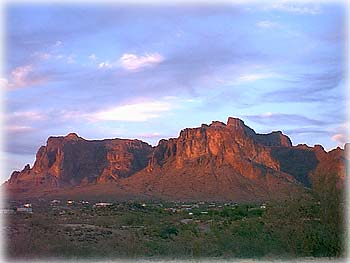
Perhaps nowhere in the entire United States is there an area full of legend, history and intrigue as the rugged 160,000 acre Superstition Mountain range in Central Arizona. These mountains were named for the many legends that surround them about lost treasures, hidden gold, and visitors from the Spaniard Peralta to Fray Marcos de Niza – the stories involving the mountain never end.
Archeological evidence indicates that people were here some 9000 years ago. Later inhabitants included the Salado, Hohokam and Apache Indians, followed by Spanish explorers and Mexican Gold Miners. Early American trappers and adventurers migrated to the area and were soon followed by cattlemen and farmers. Eventually, the U.S. Cavalry was sent in to establish forts to protect this rapidly growing population.
As modern times approached, men and women began searching for what they believed was the richest gold mine in the world. This mine was made famous by Jacob Waltz, known as "the Dutchman", who took the secret of "his mine" to the grave in 1891. Even today, treasure hunters scour the mountains searching for the Lost Dutchman Mine, but now they share the region with campers, hikers, horseback riders and conservationists in what has officially become the Superstition Wilderness Area.
The giant monolith, Superstition Mountain, rises to the height of 3,000 feet above the surrounding desert floor and dominates the eastern fringe of the Salt River Valley. The Superstition Wilderness Area, of which Superstition Mountain is part, contains some 242 square miles, or 159,780 acres, of Arizona's rugged desert mountain terrain. Mountain peaks tower 6,000 feet above sea level and deep canyon dissect this vast wilderness region. The region includes a wide-range of plants and animals that are native to the Sonoran Desert. Plants range from the giant Saguaro cactus to the stately Ponderosa pine. Mule deer, mountain lions, bobcats, coyotes, a variety of birds, reptiles and amphibians live in this fragile desert eco-system.